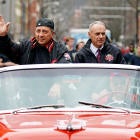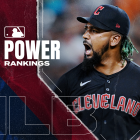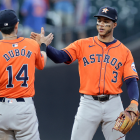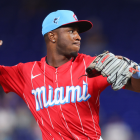CINCINNATI -- The elite names in Major League Baseball had a great offseason. Manny Machado and Bryce Harper hit the $300 million mark. Mike Trout signed an extension to be the highest-paid player ever. Nolan Arenado got a huge extension. Then there was extension fever the last few weeks of spring training. All of this might mislead people into thinking MLB's system is working perfectly.
Tell that to Dallas Keuchel, who is still without a home. We haven't even seen a single Keuchel rumor in the past two weeks. Let's use Keuchel to discuss the salary system MLB has in place.
In 2015, Keuchel was in his pre-arbitration years. He started the All-Star Game. He won the Wild Card Game in Yankee Stadium as the ace of an upstart playoff team that rebounded from some awful rebuilding years. He won the Cy Young. He also made roughly the league minimum at $529,000.
Now, we can ignore the actual figure because most of us don't come even close to that, but think about how much revenue MLB brings in and what a huge part of the Astros' revenue that year was due in large part to Keuchel. Fangraphs estimates his value that season at a whopping $45.2 million, so the Astros got well over $40 million in surplus value.
That's not a meritocracy.
In the very recent past, I'd say through the 2015-16 offseason, nearly every free agent was getting what everyone considered fair market value. Many ended up being overpaid later in their deals, but that worked everything out naturally. Players weren't making nearly what they were worth in their first three or four years, but then got overpaid on the back-end of their career and it worked out. The system was working fine for the players. Everyone was happy with labor peace going all the way back into the middle of the '90s.
In these last two offseasons, however, it has changed. It's taken far too long for the big guns to land and behind them, most guys appear to be getting the shaft. Keuchel and Craig Kimbrel among them. Players are starting to speak out and now lots of players signed extensions that on the surface is pretty club-friendly. I'll submit many of them have been scared off of free agency and the teams knew this, hence all the reaching out in extension talks. Trout, the best hitter in the game, admitted that the free agencies of Harper and Machado "drew a red flag" before he agreed to his record extension.
For many players, however, they are still getting paid far below what they are worth in their first three seasons but they also won't have an avenue to make that money back in free agency. Commissioner Rob Manfred himself has said that teams decided they no longer wanted to pay for the previous six years in free agency, but instead look forward to what they get moving forward. It makes sense and that's probably how it always should have been.
The problem is now the guys getting screwed in their first two years, compared to performance. Ronald Acuna made $545,000 last year and is making $560,000 this year. His teammate Tyler Flowers is making $4 million this year, just like last year. Is Flowers worth roughly eight times what Acuna is? Come on. The system isn't a meritocracy and Manfred says as much.
I asked Manfred, who was at the Reds' Opening Day game, about the discrepancy between performance and pay, notably in the pre-arbitration phase. Here's what he told me:
"The system in place is a principle tenant that the MLBPA has voted for since my first negotiation which was 1989 and they wanted a seniority-based system. That's what they bargained for and that's what they have. It's just not more complicated than that."
I disagree. I think it's a lot more complicated than that with the way free agency is now being treated. Player salary is down for the second straight year as a percentage of revenue, service time manipulation is a problem and lots of teams -- notably in the AL -- aren't even trying to win. And while the collective bargaining hasn't gotten contentious just yet, things continuing on this path means it will be once this CBA is up after the 2021 season.


















